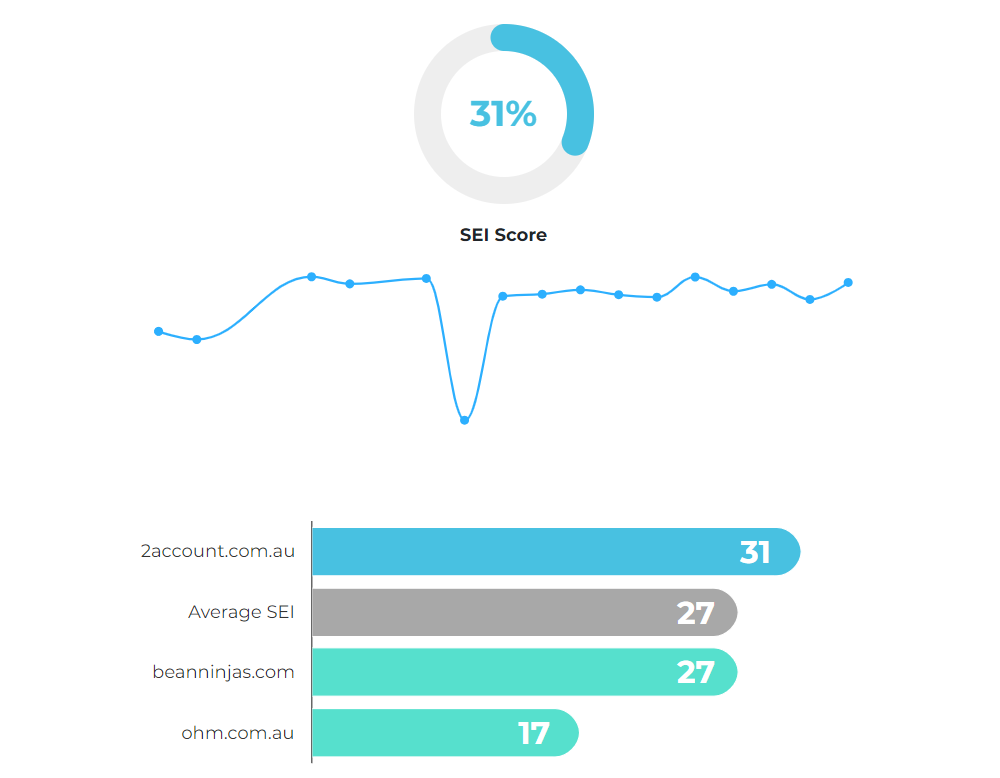Talking to your agency
Let's take a look at what sort of things you should be saying to your agency
How to find the right agency for you
If you want the help of a marketing agency then we recommend putting them to the test using the tool. If your numbers are heading in the right direction then there's a good chance your agency is pleasing the google gods. Alternatively if your numbers are fluctuating then it's time to start asking questions.
We recommend being open and honest with your agency and telling them you're using our tool to track your progress. You can then walk them through the tool once you’re comfortable doing so or send them the link to your report and let them discover SEI for themselves.
An aspect of the tool is to help high performing agencies better prove their value to their clients. Ideally they should be more than happy to work with the SEI tool and be excited at the chance to show what they're doing works.

Talking to your agency about SEI
When describing Terminology and SEI (Search Engine Influence) to your agency, you can present it as a game-changing tool that gives them insights to strategically drive results. Here’s how you might articulate it:
-
Introduction to Terminology: Explain that Terminology is an innovative platform designed to optimise online presence through strategic insights. It focuses on data-driven approaches to improve visibility and engagement on search engines.
-
What is SEI?: Define SEI as a comprehensive framework that measures and enhances your website's influence on search engines. It assesses various factors that contribute to search engine rankings and helps in strategically guiding your online marketing efforts.
-
Benefits of Using SEI:
- Actionable Insights: SEI provides clear, understandable data that allows your agency to strategise effectively, optimising campaigns based on real-time metrics.
- Collaboration: It fosters a collaborative approach, making it easier for your agency to engage with you and other stakeholders in the decision-making process.
- Performance Tracking: Emphasise that SEI allows for continuous monitoring and improvement, ensuring that strategies are aligned with the latest trends and performance metrics.
-
Client-Centric Approach: Highlight testimonials or case studies that show how agencies have transformed their client relationships and results by utilising SEI. For instance, "Agencies using SEI report more meaningful conversations with their clients and significant improvements in search performance."
-
Encourage Your Agency To Give It A Go: Suggest a trial or initial consultation to demonstrate how SEI can provide value and drive measurable results for your campaigns.
By framing Terminology and SEI in this way, you'll effectively communicate the tools potential impact and encourage your agency to adopt this approach to enhance your online presence.

Questions To Ask Your Agency
You should start by asking a series of questions that will help you determine if your agency is on the right track when it comes to handling your marketing.
These questions are:
-
Define Objectives: Clearly outline what you want to achieve with your search engine influence efforts. This could include increasing traffic, improving keyword rankings, or enhancing brand visibility.
- Discuss Metrics: Ask your agency about the key performance indicators (KPIs) they use to measure success in this area. Metrics like organic search traffic, click-through rates, and conversions are essential. You can also speak directly to the 7 elements as to what you want to track. Is it trust? Is it consistency?
- Explore Strategies: Enquire about the strategies they recommend for enhancing your search engine influence. This could involve content optimisation, backlink building, or technical SEO improvements.
- Emphasise Quality Content: Highlight the importance of producing relevant and consistent content that aligns with your audience’s needs. Quality content is crucial for building trust with search engines.
- Request Regular Reporting: Ensure that your agency provides regular updates on progress and performance. This transparency will help you gauge the effectiveness of their strategies. The reports they are providing you should be kept simple and understandable so everyone's on the same page.

Discussing your SEI reports with an agency
It’s essential to be able to communicate your SEI report findings to an agency effectively, ensuring you know what to ask for to improve each element and your overall score. Here’s what to focus on:
-
Overall Score: Focus on trust, relevance and consistency as the big drivers of your overall score before you move onto other activities. When it comes to the other elements, depending on where you're positioned, there may be opportunities for small changes that could lead to big growth.
- Trust: Ask how the agency plans to improve your website’s authority through backlinks from credible sites, digital PR efforts, and content partnerships. Discuss strategies for obtaining industry certifications or badges that could enhance your brand’s trustworthiness online.
- Relevance: Discuss how they will identify and target the most relevant keywords for your audience. Ensure they have a plan for creating content that matches search intent and optimising both on-page and off-page factors to keep your website aligned with what your audience is searching for.
- Consistency: Talk about their approach to maintaining a regular content schedule and their strategy for ensuring your messaging is consistent across platforms. Make sure they provide a clear plan for ongoing updates and monitoring. They should be keeping your content fresh and ensuring its customer and keyword relevant.
- Longevity: Encourage them to focus your marketing activities towards building your site as a long term asset by making sure your domain and online presence remain stable and persistent. They can achieve this through extending your domain ownership as long as possible and keeping your domain secure through regular maintenance and monitoring up time.
- Reputation: Ask how they will help you obtain customer reviews? Do they have recommended ways for you to respond to both positive and negative feedback?
- Engagement: How will they attract relevant organic and paid traffic. Are there other avenues we can explore unique to our product or service that would build increase website traffic.
- Identity: Enquire about their strategy for improving your website’s user experience (UX), including page speed optimisation, mobile-friendliness, and ease of navigation. Discuss their plan for testing and optimising the user journey to ensure visitors can easily find the information they need.


